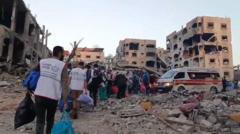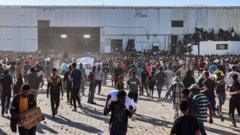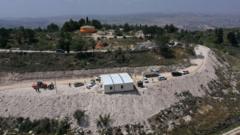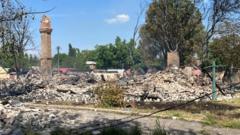As tensions escalate in the Gaza conflict, a senior Hamas representative has declared the group’s rejection of the latest ceasefire proposal endorsed by the US. The White House has announced that Israel has agreed to the plan by Special Envoy Steve Witkoff and is awaiting Hamas's formal response. During a recent press briefing, White House Press Secretary Karoline Leavitt acknowledged this proposal, which includes conditions for a 60-day ceasefire in exchange for: 10 living hostages and the remains of 18 deceased individuals.
Hamas Rejects New US Ceasefire Proposal Amid Ongoing Military Offensive

Hamas Rejects New US Ceasefire Proposal Amid Ongoing Military Offensive
A senior Hamas official has firmly stated that the group will not accept the newly proposed US ceasefire plan linked to Israel.
Hamas's dissatisfaction stems from a lack of assurances for a permanent ceasefire and a proposed humanitarian protocol that was essential during the last ceasefire. Approximately 4,000 individuals have lost their lives in Gaza over the last ten weeks, with significant displacement and looming hunger crises affecting the civilian population. Israeli Prime Minister Benjamin Netanyahu has indicated a strong stance against ceasing military operations until all hostages held by Hamas are returned, while Hamas insists it will release these captives only if hostilities end completely.
On October 7, hostilities intensified when Hamas executed a cross-border attack, leading to a massive Israeli military response. Though there have been previous temporary ceasefire arrangements facilitating the return of some hostages, the humanitarian situation continues to deteriorate as airstrikes persist, highlighting the urgent need for a lasting resolution.
Hamas's official stance and ongoing negotiations underscore the challenges in reaching a comprehensive peace deal, with both sides maintaining hardline positions as civilian suffering escalates amidst the conflict.
The ongoing violence threatens to exacerbate the humanitarian crisis, prompting calls for international intervention to facilitate aid delivery and foster long-term peace negotiations.
As the situation evolves, global observers remain vigilant in monitoring developments, questioning the effectiveness of diplomatic efforts in an increasingly fractured landscape.
On October 7, hostilities intensified when Hamas executed a cross-border attack, leading to a massive Israeli military response. Though there have been previous temporary ceasefire arrangements facilitating the return of some hostages, the humanitarian situation continues to deteriorate as airstrikes persist, highlighting the urgent need for a lasting resolution.
Hamas's official stance and ongoing negotiations underscore the challenges in reaching a comprehensive peace deal, with both sides maintaining hardline positions as civilian suffering escalates amidst the conflict.
The ongoing violence threatens to exacerbate the humanitarian crisis, prompting calls for international intervention to facilitate aid delivery and foster long-term peace negotiations.
As the situation evolves, global observers remain vigilant in monitoring developments, questioning the effectiveness of diplomatic efforts in an increasingly fractured landscape.






















